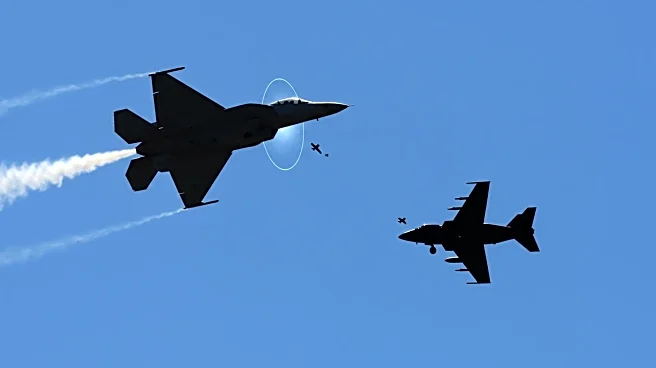What's Happening?
In a notable historical incident, the Swedish Air Force's JA-37 Viggen fighter successfully achieved a missile lock on the SR-71 Blackbird, a legendary American spy plane known for its speed and altitude capabilities. This event occurred during the Cold War era, specifically in 1987, when Swedish pilots intercepted the SR-71 on its routine 'Baltic Express' route. The Viggen, despite its lower speed and altitude compared to the Blackbird, managed to overcome these limitations through advanced data links and meticulous planning. The Swedish pilots demonstrated exceptional skill, intercepting the SR-71 multiple times and even escorting a damaged Blackbird to safety, protecting it from potential Soviet threats.
Why It's Important?
This incident highlights the strategic and technical prowess of the Swedish Air Force during the Cold War, showcasing their ability to intercept one of the fastest jets in history. It underscores the importance of planning and technological advancements in military operations. The event also reflects the mutual respect between military aviators, as Swedish pilots assisted the American crew in a time of need. This cooperation between nations, despite the geopolitical tensions of the era, illustrates the complex dynamics of international military relations and the potential for collaboration even amidst conflict.
What's Next?
While the incident itself is historical, it serves as a reminder of the ongoing need for nations to invest in advanced military technology and training. The lessons learned from such encounters continue to influence modern military strategies and international relations. As technology evolves, countries may seek to enhance their capabilities to address similar challenges in the future, emphasizing the importance of innovation and preparedness in defense strategies.
Beyond the Headlines
The incident also raises questions about the ethical considerations of military engagements and the role of neutral countries in global conflicts. Sweden's actions during this event reflect a commitment to humanitarian principles, prioritizing the safety of individuals over geopolitical interests. This approach may inspire other nations to consider the broader implications of their military actions and the potential for peaceful resolutions in international disputes.








